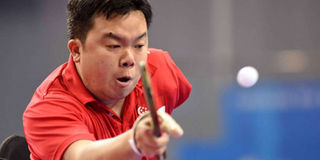Para athletes 'threatened' for raising concerns over classification

This photo taken on December 8, 2015 shows Singaporean table tennis para athlete Jason Chee hitting a shot against Thailand's Natthawut Thinathet during the men's singles table tennis final at the 8th ASEAN Para Games in Singapore. PHOTO | STEFANUS IAN |
What you need to know:
- Athletes are placed in categories for competition based on their impairment called sport classes.
- The system determines which athletes are eligible to compete in a sport and how athletes are grouped together for competition.
LONDON
Para athletes have been threatened with deselection for raising concerns over the classification of other competitors, ex-wheelchair racer Tanni Grey-Thompson told British lawmakers on Tuesday.
The 11-time Paralympic champion said the classification system that underpins Paralympic sport is not "fit for purpose".
Athletes are placed in categories for competition based on their impairment called sport classes. The system determines which athletes are eligible to compete in a sport and how athletes are grouped together for competition.
Grey-Thompson was speaking as a witness at the House of Commons digital, culture, media and sport (DCMS) committee hearing into claims British athletes have manipulated the process that ensures fair competition in Paralympic sport.
"We need to ask the question whether classification is fair and transparent and whether athletes can make an appeal or complaint in an open and fair process," she said.
"Judged on what I have been told, I don't believe we can answer that question right now."
Grey-Thompson, 48, who now sits in Britain's second parliamentary chamber, the House of Lords, said she had heard from athletes and their parents who believed the classification system was open to abuse and had been abused by other British athletes.
She also said she was placed under "extreme pressure" by "bodies within the system" to find out the details of those allegations, which she refused to give as they had come to her under condition of anonymity.
Classification campaigner Michael Breen used the example of an athlete with "remitting and relapsing" multiple sclerosis in the T38 class, which he described as the "traditional" home for athletes with cerebral palsy.
Breen told MPs this case was an example of how athletes are currently classified by people without adequate medical expertise, international classifications are sometimes carried out by people of the same nationality as the athlete and "it is all too easy" for national governing bodies to exert influence to make sure certain athletes get the right classification.
As a result, Breen said athletes with cerebral palsy are being "humiliated" by less disabled competitors and they are "effectively being pushed out of the sport".
British Paralympic Association chief executive Tim Hollingsworth said the debate around the classification system was an example of Paralympic sport's "growing pains" and likened it to a school striving to be ranked as "outstanding" by the education regulator.
But committee chairman Damian Collins disagreed and said the panel had received written evidence that suggests "it is much more serious than that and if it was a school it would be in special measures".





